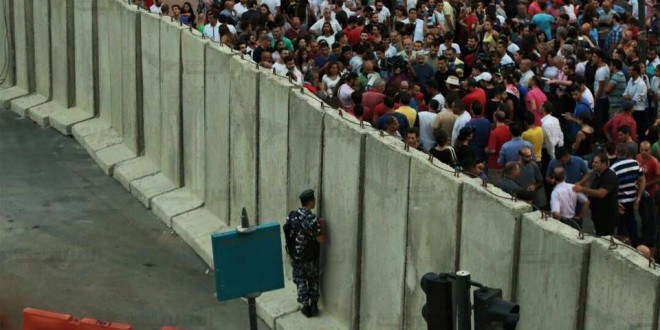“When dictatorship is a fact, revolution becomes a right.”
Victor Hugo
Lebanon, “the Switzerland of the Middle East”, is a famous analogy describing the once great country that hosted both Western and Eastern civilizations on a small piece of land in the Mediterranean, characterized by a population of roughly 4 million inhabitants.
The 15 ruthless years of the 1975 civil war rocked the country and tore it apart, branding its people, no longer just Lebanese but as Sunnites, Shiites, Christians, Druze and Armenians. The war ended after the Syrians pressured for a truce and the “Taif Accord” (National Reconciliation Accord) was born.
In the so-called ‘Democratic’ Republic of Lebanon, warlords of the civil war feed on sectarian divide that was caused by the widespread fearmongering and brainwashing of the innocent masses while taking advantage of past fears and traumas. Year after year of being elected and maintaining hereditary positions, a pseudo-anarchic structure was born to keep the balance of power, all while feeding their endless hunger for money and absolute authority. Whether it be for the lack of better alternatives, or the need for their religious sects to be represented by a continuously elected the same party-religious faction Leaders, many believed that these leaders in the current government would guarantee their survival and political representation for the sake of the people, resulting in them staying in power with no chance of change since the last election in 2009.
The “Taif Accord” (National Reconciliation Accord) proved to be a deal with the devil. This deal would drench the country into a sectarian loophole, further nurturing and feeding on people’s fears of a possible supremacy of other religious factions and another possible civil war. Economic and social development wasn’t on Lebanon’s agenda anymore.
At the time the Accord seemed like the only fathomable solution to mend fences and keep the country stable. However, it further divided the country, and each warlord got a piece of the cake, with each sect being given to a position of power in the government. The Sunnites got the Prime Minister, the Shiites got the Head of Parliament and the Christians got the President of the Republic. The division didn’t stop there; it further spread and compromised ministries, institutions, and other positions of public administration.
Today, after 30 years, the same politicians still govern Lebanon. What is being witnessed is the appointment of the same people, the same faces, and the same sterile political strategies. “I don’t understand how a war criminal and division instigator is expected to bring peace, stability and development into a country he destroyed 30 years ago”, a desperate citizen said to the cameras during one of the latest protests.
With the lack of basic human rights and almost absent public services unequally distributed throughout the country like electricity, clean water, transportation, and health care, were never on the procrastinating government agenda. In a country were newly discovered oil resources haven’t been exploited yet because of political impasses, the gap between the rich and the poor is increasing, and an ever-growing public debt that reached 69.02 billion dollars. The debt is at an estimated 140% of GDP in 2015, according to a 2015 survey released by the World Economic Forum. The high debt levels have also contributed to an exceptionally high interest bill, at nearly 40% of government revenues. The persistent budget deficits will inevitably further increase the public debt stock. So far, no plan has ever been presented to solve this issue.
Lebanon has become like a cancer patient left to battle with his disease all alone while others watch his slow death with mockery. In a multiple territorial dictatorship that is Lebanon, fear has always been and will always be the most efficient weapon in the hands of the ruling minority, following the policy of “divide and conquer”. They have managed to subdue an entire nation and deprive it of its most basic human rights and decent living, while its politicians bulk up in cash becoming richer than ever. However today, memories of a cruel civil war have almost faded with the new generation of brave men and women who dream of a secular democratic nation, and most of all; a corruption free and proactive government.
Peaceful protests broke out in Lebanon after the “garbage crisis” that revealed more governmental corruption, mismanagement of public funds and assets and deterioration in Lebanese politics. On July 17 the biggest dumpsite called the Nehme landfill was closed after the end of the contract with the waste management company “Sukleen”. The landfill was closed following a scandal involving Sukleen’s waste mismanagement and as a result, garbage started accumulating on the streets of the Beirut. On the 21st of July the first protest of roughly 20 people led by young college students and civil society individuals and activists, took to the streets along with the frustration of the people. Some of them where arrested and released shortly afterwards.
However the movement didn’t stop here. The brave group created their first page on Facebook calling it “you stink”, in Arabic “Tolet Rihetkon”. Through which they started documenting and sharing pictures, videos and posts of the government’s hazardous dumping of trash late at night in rivers, forests and other inapt places. This popular movement born from despair as well as hope of building a better Lebanon, managed to rally around 20,000 protesters on the 22 of august 2015 in another protest, after a ministerial decision to sign a contract with 6 new waste management companies to replace Sukleen. Six new Sukleen replacements were to be born instead of one. Knowing that the ton of garbage in Lebanon had the highest cost in the world: $140 per ton, the new deal got the price of $165; an even higher price.
The protests were met with extreme violence by government forces, where police and riot control personnel used water cannons, rubber bullets, tear gas, and even live ammunition in the air, not to mention the beatings and unlawful imprisonments of peaceful protestors, causing many injuries and spreading terror amongst young, unarmed men and women. The police even attacked journalists and news reporters on the ground breaking their cameras in order to prevent them from live broadcasting. The demands grew with the growth of the protests. A protest of 100,000 participants took the streets of Beirut on august 29th. The government’s new garbage deal fell apart.
The people chanted revolution, freedom, democracy, change and punishment for the sources of corruption. Many movements were born on social media (Facebook, Twitter, and online blogs), as well as continuous protests in the streets by groups of all sizes almost every day. Active civil movements like “Badna Nhassib”, translated to “we want justice”, and “Min ajel al Joumhourya”, translated to “For the Republic” and others joined the “You Stink” campaign in criticizing the overly dominant trend of impunity in Lebanon, and calling for serious investigations regarding the widespread government corruption, mismanagement and irresponsibility.
The government met another time later this September only to end up failing to come up with a solution and to implement initiatives with presenting a poor plan that has no rudimentary or legitimate mechanisms of execution. The government’s sterility triggered more demands on the ground, leading the public to call for the resignation of both Ministers of the Environment and Interior for drastically failing to fulfill their duties.
However, the government stands stagnant, while its warlords, who failed to pass laws or reforms in a country that is in dire need of serious changes and development on all fronts in the last 10 years. The almost two years presidential vacuum stands as the greatest proof of such stagnation. The failure to elect a President for the Republic, as well as the unconstitutionally self-reelection of the parliament currently in power today by simply extending their ruling period without going through real elections, are clear calls for radical changes.
Sustainable environmental solutions were presented by the activists’ movements, ironically “doing the government’s job” as to let the municipalities handle the garbage crisis, by making their rightful funds available in order to implement long term, harmless and effective recycling processes. But the government kept botching these initiatives. “They won’t let us reach the parliament, they closed the area with wires. The parliament is ours, not theirs”, cried one frustrated citizen to the cameras.
In the midst of a refugee crisis where, according the UNHCR Report, nearly two million Syrian refugees have taken refuge in Lebanon, a country with poorly developed infrastructure unable to absorb and care for such numbers, the warlords still organize fruitless party meetings every now and then to discuss their political agendas while Lebanon fights for freedom and for its basic human rights, for the future of its children, for secularism, and for a clean environment… to be continued.
by Rola Mckey



